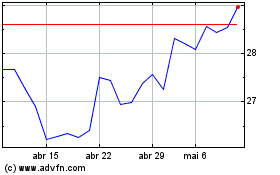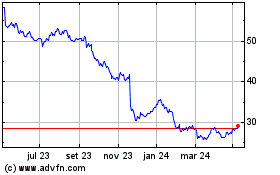Roundup Plaintiffs' Lawyers Spar Over $800 Million in Fees
04 Março 2021 - 10:29AM
Dow Jones News
By Sara Randazzo
Plaintiffs' firms that led the legal campaign against Bayer AG
are fighting over $800 million in fees from the Roundup weedkiller
litigation, arguing that they deserve a bigger slice of one of the
largest-ever corporate settlements than firms that joined
later.
The high-stakes dispute is coming to the fore eight months after
Roundup's maker, Bayer, announced that it would pay up to $9.6
billion to resolve 125,000 cancer claims brought by dozens of law
firms. The fee fight underscores increasing tension between law
firms that do the in-court work necessary to win cases and those
that advertise to sign up scores of clients.
The Roundup deal isn't a single, all-encompassing pact that
needs signoff from a court but instead a series of confidential
settlements between Bayer and the many law firms with eligible
clients. Some of those firms spearheaded the litigation, but most
signed up clients later in the process, building on work already
started.
Six law firms appointed by a federal court as leaders in the
litigation are asking a judge to set aside 8.25% of the Bayer
settlements into a fund to be distributed among those firms and
others that handled the brunt of the work. Under their proposal,
those firms would get a share of the fund and reap whatever fees
they agreed upon with their clients. Plaintiffs' lawyers often take
a cut of more than 30% from such settlements.
The leadership firms, led by Andrus Wagstaff PC, Weitz &
Luxenberg PC and the Miller Firm, argue that they invested at least
$20 million and years of time to build a case linking Roundup to
cancer. They described the common-benefit fund as a sort of "tax"
on law firms that waited until the litigation was successful before
getting involved.
Several law firms have objected, saying the court doesn't have
the power to create the common fund -- estimated at $800 million.
They say the leadership team is trying to double-dip, speculating
that their confidential deals with Bayer are already more lucrative
than those that other firms received.
"They've already been adequately compensated multiple times
over," Melissa Ephron, a Texas lawyer objecting to the extra fees,
said at a virtual court hearing on the matter Wednesday.
The confidential nature of Bayer's settlements means the public
is unlikely to know each law firm's take and how much money the
affected plaintiffs who blame their cancer on Roundup use will
personally receive.
Bayer hasn't conceded that its weedkiller can cause non-Hodgkin
lymphoma and will continue to sell the product without a
cancer-warning label.
U.S. District Judge Vince Chhabria in San Francisco, who
oversees around 4,000 Roundup cases filed in federal court, raised
doubts Wednesday that he has the authority to require every law
firm striking a deal to give up 8.25%.
"They all got their settlements because you achieved such a good
result. There's no question about that," he said during the
hearing, but added that he wasn't convinced it was appropriate for
the leadership to get a windfall.
The fight highlights a dynamic playing out more in recent years
in large cases alleging harms from drugs or everyday products. A
sophisticated ecosystem of advertisers and marketers sign up
plaintiffs in bulk and pass them off to lawyers who file claims in
court, often with little vetting on the strength of the cases. The
rising number of plaintiffs can help pressure companies to
settle.
The lead lawyers for Roundup plaintiffs pointed to this dynamic
to bolster their argument for why they deserve more money than the
more than 500 other law firms with Roundup clients.
After the lead firms had some key early success in the
litigation, "a tsunami of advertising resulted in thousands of new
lawsuits filed by law firms that had hedged their bets," the
leadership team wrote in a January filing.
"To not tax lawyers who literally sit on the sidelines...would
be to incentivize lawyers to do nothing in the future...and wait
for the lawyers who do the litigation to bring it home," Robin
Greenwald, one of the lead lawyers, told Judge Chhabria
Wednesday.
The lead law firms began probing a link between Roundup and
non-Hodgkin lymphoma in 2015 after the International Agency for
Research on Cancer concluded that Roundup's active ingredient,
glyphosate, was "probably carcinogenic" in humans.
The lead firms say they obtained and organized millions of
internal documents from Monsanto Co., Roundup's creator, which was
later purchased by Bayer. They interviewed 35 Monsanto employees
and hundreds of others relevant to the litigation, found scientists
to attest to a link between the product and illness and won crucial
court approval allowing their scientific experts to testify to
juries. Their work, which for many of the lawyers was a full-time
job for years, they argue, led to three large jury verdicts in
California in favor of plaintiffs and momentum that resulted in the
settlement.
Bayer has been trying to cap its Roundup liabilities after years
of shareholder concern and sliding stock prices. It is still trying
to reach settlements with holdout law firms that are threatening to
push their cases to trial. The company also is seeking court
approval this month for a class-action that would resolve Roundup
cases that haven't yet been filed, including from people who have
used Roundup but not developed non-Hodgkin lymphoma.
Write to Sara Randazzo at sara.randazzo@wsj.com
(END) Dow Jones Newswires
March 04, 2021 08:14 ET (13:14 GMT)
Copyright (c) 2021 Dow Jones & Company, Inc.
Bayer (TG:BAYN)
Gráfico Histórico do Ativo
De Fev 2025 até Mar 2025

Bayer (TG:BAYN)
Gráfico Histórico do Ativo
De Mar 2024 até Mar 2025
